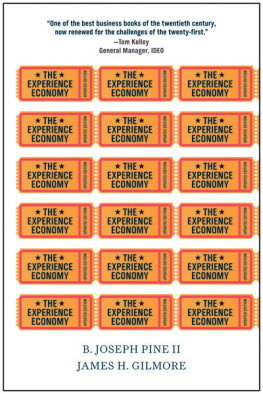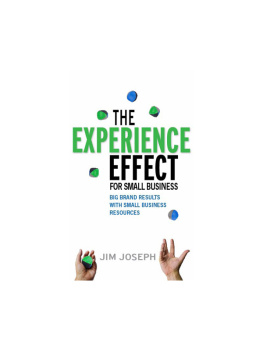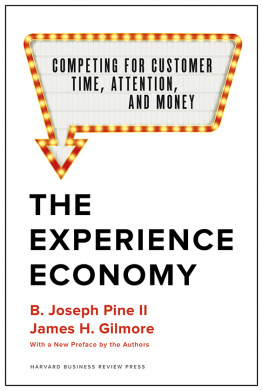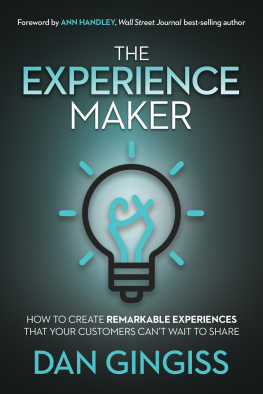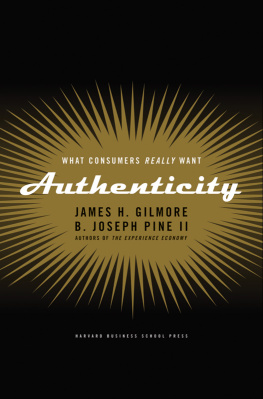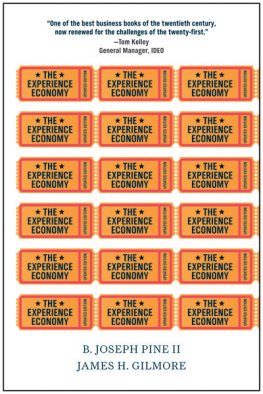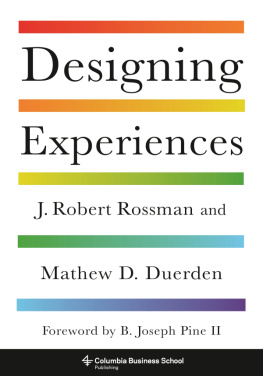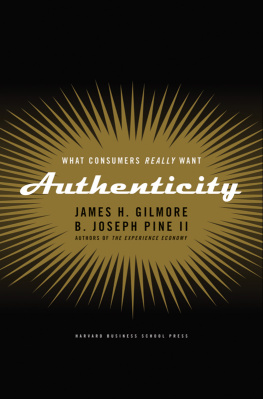* THE *
EXPERIENCE
ECONOMY
UPDATED EDITION
B. JOSEPH PINE II
JAMES H. GILMORE
HARVARD BUSINESS REVIEW PRESS
Boston, Massachusetts
Copyright 2011 B. Joseph Pine II and James H. Gilmore
All rights reserved
Printed in the United States of America
10 9 8 7 6 5 4 3 2 1
No part of this publication may be reproduced, stored in or introduced into a retrieval system, or transmitted, in any form, or by any means (electronic, mechanical, photocopying, recording, or otherwise), without the prior permission of the publisher. Requests for permission should be directed to , or mailed to Permissions, Harvard Business School Publishing, 60 Harvard Way, Boston, Massachusetts 02163.
Library of Congress Cataloging-in-Publication Data
Pine, B. Joseph.
The experience economy / B. Joseph Pine II, James H. Gilmore.
p. cm.
Rev. ed. of: The experience economy : work is theatre & every business a stage. 1999.
Includes bibliographical references and index.
ISBN 978-1-4221-6197-5 (alk. paper)
1. Product management. 2. Marketing. 3. Diversification in industry.
4. Customer services. I. Gilmore, James H., 1959- II. Title.
HF5415.15.P56 2011
658.5'6dc22
2010054391
To the Author and Perfecter of our faith.
Preview to the Updated Edition:
Beyond Goods and Services
Goods and services are no longer enough. That sentence was the reading line (following the book's subtitle) that accompanied the original hardbound edition of The Experience Economy in 1999. Perhaps not enough people read the line, let alone took it to heart. Although the book has since been published in fifteen languages and purchased by more than three hundred thousand people worldwide, the book's thesis has not sufficiently penetrated the minds of enough business leaders (and policy makers) to give full bloom to a truly newand desperately neededeconomic order. Relying on the manufacturing of goods and the delivery of services remains the mindset of too many executives (and politicians), prohibiting the shift to more vibrant enterprises offering experiences (and thus more robust national economies). So let us here be most clear: goods and services are no longer enough to foster economic growth, create new jobs, and maintain economic prosperity. To realize revenue growth and increased employment, the staging of experiences must be pursued as a distinct form of economic output. Indeed, in a world saturated with largely undifferentiated goods and services the greatest opportunity for value creation resides in staging experiences.
The actions of individual entrepreneurs prove the point. Contrast the success of leading experience innovators over the past twelve years with the failure of rival companies (and whole industries, for that matter) that either missed or ignored our economic message. Take retail. Countless chains have met their demise in this time frame as they insisted on merely merchandising finished goods. Walmart and online sellers ate their lunch. Yet experiences such as Build-A-Bear Workshop flourished. In 1999, founder Maxine Clark had just opened her first bear-making venue. Told by conventional retail experts that launching such an enterprise was foolhardy, Clark drew inspiration from our July/August 1998 Harvard Business Review article, Welcome to the Experience Economy. Today, Build-A-Bear profitably operates more than three hundred experience outlets in the United States alone, and almost five hundred worldwideall venues where consumers mass customize their own plush toy animals within an engaging retail factory experience.
Similarly, Pleasant Rowland had just opened her first American Girl Place in Chicago in late 1998. From the outset she conceived her American Girl dollseach themed to a specific period of American historyas only a prop for broader book-reading and character-building experiences. With yet additional American Girl Places in place today, American Girl thrives inside Mattel, which otherwise struggles to revive Barbie and other toys (seen as mere goods by most American girls and boys today). And what store is now the envy of every mall owner and developer? Apple. Why? Customers clearly flock there for not only the goods but also the store experience, with sales per square foot an order of magnitude greater than those of the typical retailer.
Interestingly enough, Apple studied the hospitality experiences at both Ritz-Carlton and various boutique hotels for design inspiration in creating its revolutionary new retail format. (Gateway had previously attempted selling direct via retail stores, as had Dell with kiosks, but both lacked a rich appreciation for experience design, opting instead to retain typical merchandising footprints.) Thus, experiencing the wares at an Apple Store feels uncannily like bellying up to the bar at a hotel lounge. Apple's in-store Genius Bars, iPod Studios, and classroom amphitheatres bear a remarkable resemblance to the registration areas, concierge desks, and meeting space experiences of better boutique hotels. Moreover, these design hotels played a role in changing the competitive landscape in their own industry. Thanks to Bill Kimpton, Ian Schrager, Chip Conley, and other boutique hoteliers, no hotel chain can today afford to merely provide basic service activities and ignore its guests' experiences. From furnishing sociable lobby spaces to providing beds that promise better sleep experiences (credit Schrager for kick-starting innovation in the former, and credit Westin's Heavenly Bed for the latter), the hospitality industry now clearly creates new value on the basis of experiences.
Consider next the Geek Squad. At the time of The Experience Economy's release in 1999, founder Robert Stephens employed fewer than a dozen Special Agents in his 24-hour computer support task torce. Today, thanks to the Geek Squad's acquisition and rollout by Best Buy, more than twenty-four thousand Geek Squad geeksSpecial Agents, Double Agents, and (inside Best Buy stores) Counter Intelligence Agentsstage compelling installation and repair experiences worldwide. Perhaps no other company matches the Geek Squad in exemplifying the experience-staging principles we outline in this book, especially the proposition that work is theatre. The thematic costuming integral to the Geek Squad being the Geek Squad (and readily and naively dismissed by other service providers) demonstrates the tangible valueto customers, to employees, and to shareholdersthat you can create by boldly treating services as the stage and goods as the props for staging engaging experiences. Think of the number of fragmented service industriescar washes, home decorators, landscapers, laundromats, and educational tutors, to name a fewthat would benefit from an enterprise emulating the Geek Squad's experience mindset.
The economic doldrums in which much of the advanced world found itself after the 2008 financial crisis resulted from a failure to experientially innovate like each of these companies. The Industrial Economy has had its day. The invention and production of new goods once fueled the world's advanced economies. It is today very difficult to inventand therefore rare to encountera truly new good; most differentiation of goods now involves the enhancement or modification of items within existing product categories and not the creation of wholly new categories. (Consumer electronics and medical technology represent two notable exceptions; but consider that when buying these items, customers most value not the goods themselves but the experiences and transformations they enable.) Even when someone invents a truly new good, manufacturers instinctively seek to automate the work required to make it and scale up as soon as possible. Although revenue growth may follow, these manufacturers add few new jobs to the world.

